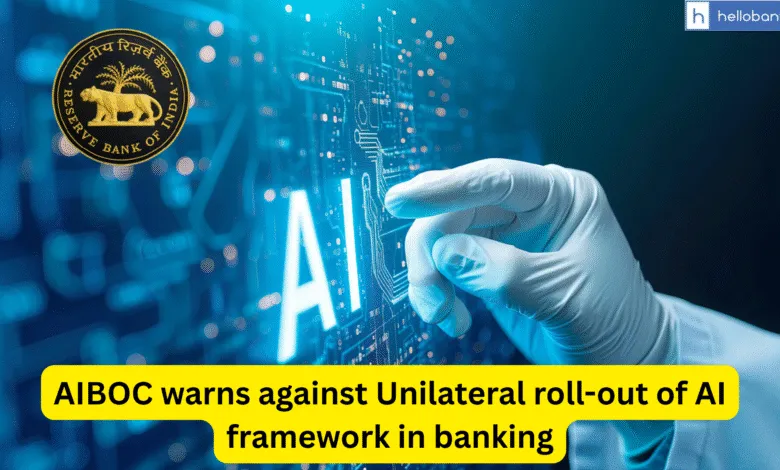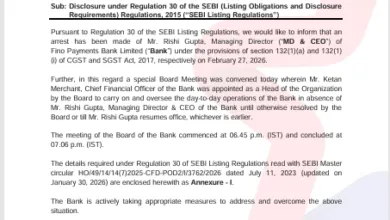AIBOC warns against Unilateral roll-out of AI framework in banking

AIBOC has issued caution against Unilateral roll-out of AI framework in banking; calls for social dialogue, binding safeguards, and a worker and consumer first roadmap. Recently, the Reserve Bank of India (RBI) had issued a detailed report on use of AI in Banking.
The All India Bank Officers’ Confederation (AIBOC) has raised strong concerns about the Reserve Bank of India’s new framework on Artificial Intelligence (AI) in banking, called the Framework for Responsible and Ethical Enablement of Artificial Intelligence (FREE-AI).
According to AIBOC, while the RBI’s intention of making AI trustworthy, fair, and safe is welcome, introducing it suddenly without proper consultation with trade unions, consumer groups, and civil society could create more risks than benefits.
The Confederation warned that AI in banking cannot replace public trust. RBI’s seven guiding principles (7 Sutras) — Trust, People First, Fairness, Accountability, Understandability, Safety, and Innovation — are good in theory, but unless they are backed by legal safeguards for customers and protections for employees, the framework could harm rather than help.
Download RBI Report on Use of AI in Banks [PDF]
Key concerns raised by AIBOC
AIBOC has raised some of the important concerns as listed below:
- Legal responsibility is unclear – AI models often work unpredictably, which makes it difficult to fix responsibility when things go wrong. AIBOC wants clear rules on liability, proper documentation, and audit systems to prevent misuse of customer data and unfair decisions.
- Employees should not be blamed for AI failures – Decisions will still be carried out by bank officers, but if AI goes wrong, they should not be punished unfairly. AIBOC suggests clear accountability structures and HR policies to protect staff.
- AI risks can spread quickly – Problems like bias, misinformation, and cyber-attacks could create large-scale damage. AIBOC recommends strict risk management, constant testing, backup systems, and human oversight.
- Private banks may get an unfair advantage – AI adoption requires huge investment in data, computing, and expertise. Without government and RBI support for public sector banks, private players could dominate the market.
- Risk of exclusion of vulnerable groups – If AI-based decisions are not carefully designed, small borrowers, farmers, and weaker sections may be denied credit unfairly. AIBOC insists on a Right to Human Review, meaning customers must be able to challenge AI-based rejections.
- Job security and morale of employees – AI may replace certain roles unless there are guarantees of redeployment and upskilling. AIBOC demands that no employee should lose their job because of AI, and a national-level training program should be launched.
- Impact on NPAs (bad loans) – Wrong risk classification by AI during economic stress could worsen the NPA problem. AIBOC suggests strong monitoring, testing, and reporting mechanisms.
- Inequality may increase – If AI mainly benefits large corporate borrowers, small customers may suffer. AIBOC wants specific safeguards to ensure financial inclusion.
Trade unions worldwide are taking similar stands. AIBOC said that in Australia, unions demand agreements before AI is used, covering job security and privacy. In the US, big unions are pushing for laws to ensure human oversight in AI decisions. These examples show that AI works best when workers’ voices are included in the process.
Download RBI Report on Use of AI in Banks [PDF]
AIBOC’s demands
To make AI safe, fair, and inclusive in banking, AIBOC has put forward following demands:
- Formation of a National Council for AI in Banking with representation of trade unions, consumer groups, and civil society.
- A step-by-step adoption of AI with a ban on high-risk uses until strong safeguards are in place.
- No forced job losses, proper training, and protection of employees from being scapegoated.
- Customer rights, including clear disclosures, human review, local-language explanations, and compensation in case of harm.
- Fair competition for public sector banks through government support for AI infrastructure and resources.
- Vendor accountability, ensuring that outsourcing partners are also responsible for bias, data misuse, or errors.
Banking is one of the most sensitive sectors of the economy because it deals directly with people’s money and financial security. Any mistake, misuse, or bias can have serious consequences for customers as well as banks. This is why the use of Artificial Intelligence (AI) in banking must be introduced with extreme caution.
AI can certainly help improve efficiency, detect fraud faster, and provide better customer service. But at the same time, it can also create risks such as wrong decisions, data privacy violations, and exclusion of vulnerable groups if not implemented responsibly. Unlike many other industries, banking requires a very high level of trust and accountability, and technology should never be allowed to compromise that.
Therefore, before rolling out AI in banking, there must be strong safeguards, clear accountability, and proper consultation with employees, regulators, and consumers. Only then can AI be used to strengthen public confidence and ensure that technology serves both the people and the economy.
Download RBI Report on Use of AI in Banks [PDF]
